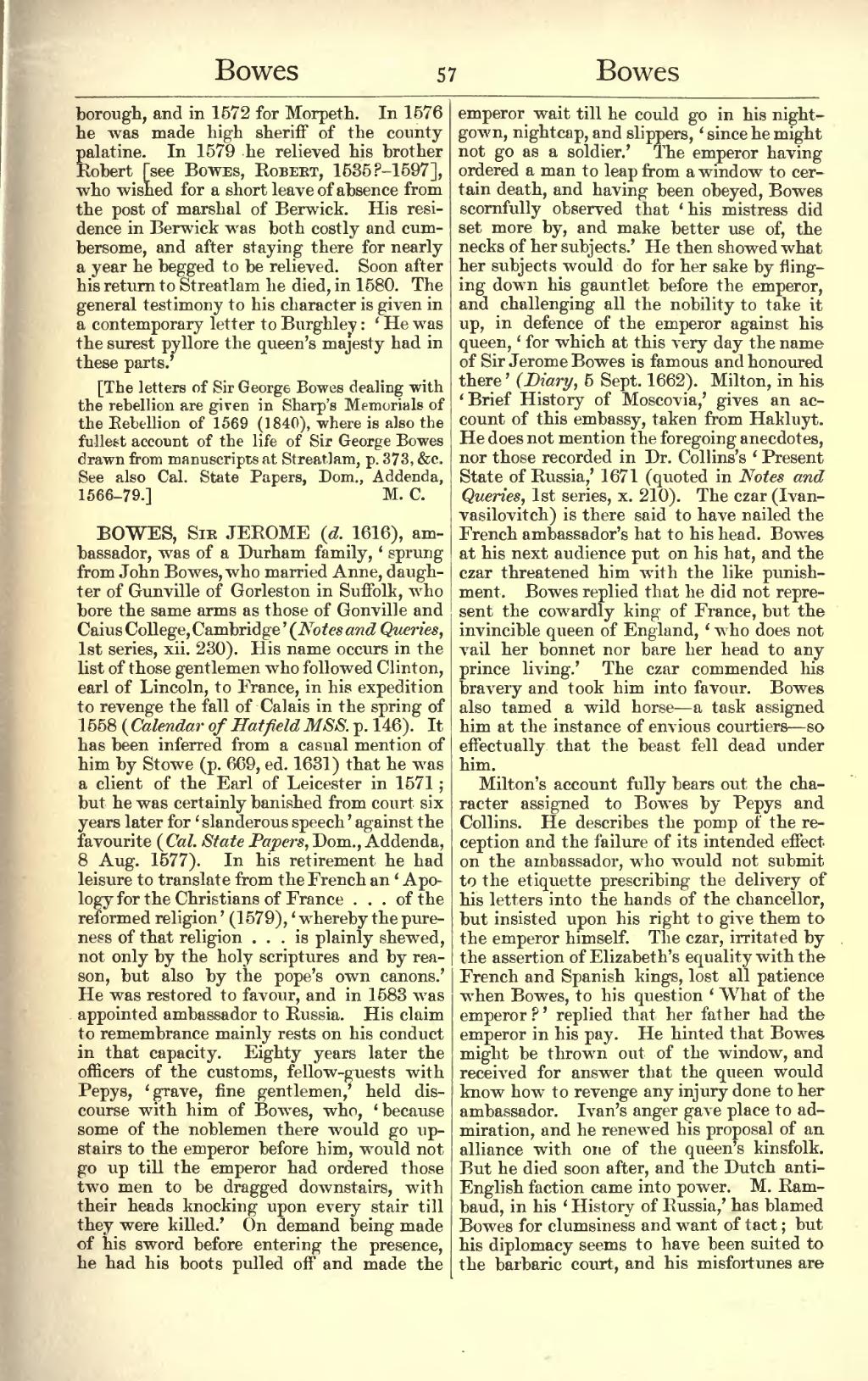borough, and in 1572 for Morpeth. In 1576 he was made high sheriff of the county palatine. In 1579 he relieved his brother Robert [see Bowes, Robert, 1535?-1597], who wished for a short leave of absence from the post of marshal of Berwick. His residence in Berwick was both costly and cumbersome, and after staying there for nearly a year he begged to be relieved. Soon after his return to Streatlam he died, in 1580. The general testimony to his character is given in a contemporary letter to Burghley: 'He was the surest pyllore the queen's majesty had in these parts.'
[The letters of Sir George Bowes dealing with the rebellion are given in Sharp's Memorials of the Rebellion of 1569 (1840), where is also the fullest account of the life of Sir George Bowes drawn from manuscripts at Streatlam, p. 373, &c. See also Cal. State Papers, Dom., Addenda, 1566-79.]
BOWES, Sir JEROME (d. 1616), ambassador, was of a Durham family, 'sprung from John Bowes, who married Anne, daughter of Gunville of Gorleston in Suffolk, who bore the same arms as those of Gonville and Caius College, Cambridge' (Notes and Queries, 1st series, xii. 230). His name occurs in the list of those gentlemen who followed Clinton, earl of Lincoln, to France, in his expedition to revenge the fall of Calais in the spring of 1558 (Calendar of Hatfield MSS. p. 146). It has been inferred from a casual mention of him by Stowe (p. 669, ed. 1631) that he was a client of the Earl of Leicester in 1571; but he was certainly banished from court six years later for 'slanderous speech' against the favourite (Cal. State Papers, Dom., Addenda, 8 Aug. 1577). In his retirement he had leisure to translate from the French an 'Apology for the Christians of France ... of the reformed religion' (1579), 'whereby the pureness of that religion ... is plainly shewed, not only by the holy scriptures and by reason, but also by the pope's own canons.' He was restored to favour, and in 1583 was appointed ambassador to Russia. His claim to remembrance mainly rests on his conduct in that capacity. Eighty years later the officers of the customs, fellow-guests with Pepys, 'grave, fine gentlemen,' held discourse with him of Bowes, who, 'because some of the noblemen there would go upstairs to the emperor before him, would not go up till the emperor had ordered those two men to be dragged downstairs, with their heads knocking upon every stair till they were killed.' On demand being made of his sword before entering the presence, he had his boots pulled off and made the emperor wait till he could go in his nightgown, nightcap, and slippers, 'since he might not go as a soldier.' The emperor having ordered a man to leap from a window to certain death, and having been obeyed, Bowes scornfully observed that 'his mistress did set more by, and make better use of, the necks of her subjects.' He then showed what her subjects would do for her sake by flinging down his gauntlet before the emperor, and challenging all the nobility to take it up, in defence of the emperor against his queen, 'for which at this very day the name of Sir Jerome Bowes is famous and honoured there' (Diary, 5 Sept. 1662). Milton, in his 'Brief History of Moscovia,' gives an account of this embassy, taken from Hakluyt. He does not mention the foregoing anecdotes, nor those recorded in Dr. Collins's 'Present State of Russia,' 1671 (quoted in Notes and Queries, 1st series, x. 210). The czar (Ivan-vasilovitch) is there said to have nailed the French ambassador's hat to his head. Bowes at his next audience put on his hat, and the czar threatened him with the like punishment. Bowes replied that he did not represent the cowardly king of France, but the invincible queen of England, 'who does not vail her bonnet nor bare her head to any prince living.' The czar commended his bravery and took him into favour. Bowes also tamed a wild horse—a task assigned him at the instance of envious courtiers—so effectually that the beast fell dead under him.
Milton's account fully bears out the character assigned to Bowes by Pepys and Collins. He describes the pomp of the reception and the failure of its intended effect on the ambassador, who would not submit to the etiquette prescribing the delivery of his letters into the hands of the chancellor, but insisted upon his right to give them to the emperor himself. The czar, irritated by the assertion of Elizabeth's equality with the French and Spanish kings, lost all patience when Bowes, to his question 'What of the emperor?' replied that her father had the emperor in his pay. He hinted that Bowes might be thrown out of the window, and received for answer that the queen would know how to revenge any injury done to her ambassador. Ivan's anger gave place to admiration, and he renewed his proposal of an alliance with one of the queen's kinsfolk. But he died soon after, and the Dutch anti-English faction came into power. M. Rambaud, in his 'History of Russia,' has blamed Bowes for clumsiness and want of tact; but his diplomacy seems to have been suited to the barbaric court, and his misfortunes are
